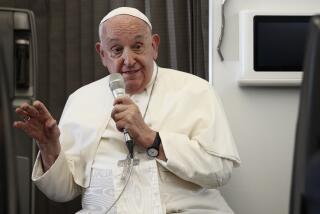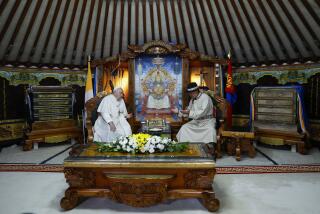Pope Ends Nigeria Visit With a Call for Respect
- Share via
ABUJA, Nigeria — Applauded for a second day by hundreds of thousands of worshipers, Pope John Paul II ended a three-day visit to Nigeria on Monday with a new call for an end to corrupt, repressive rule in Africa’s most populous country.
“Respect for every human person . . . must ever be the inspiration and guiding principle behind your efforts to increase democracy and strengthen the social fabric of your country,” the pope, 77, told a Mass here and a nationwide TV audience of millions. “The dignity of every human being, his inalienable rights, the inviolability of life, freedom and justice, the sense of solidarity and the rejection of discrimination--these must be the building blocks of a new and better Nigeria.”
The Roman Catholic leader left Africa as President Clinton arrived for a journey through six other sub-Saharan nations, which, for the most part, enjoy democracy, free elections and economic growth. Western leaders have shunned Nigeria as a pariah state, making the pope one of the few prominent visitors here in recent years.
Ruled by military officers for 14 years, Nigeria has sunk into a morass of corruption that has wrecked its oil-rich economy and enriched a small elite. Gen. Sani Abacha, the current president, routinely jails his critics and censors the press.
In three days of speeches and in a private meeting with Abacha, John Paul stressed that free presidential elections promised by the general in August offer Nigeria’s 104 million people hope for a new beginning.
From an altar in a field on the edge of Abuja, Nigeria’s new federal capital, the pope said Monday: “This city is meant to represent the dawning of a new era . . . in which every Nigerian citizen--every man and woman--is called to play a part in the building of a new reality [that will] leave behind the effects of poverty, disputes, wars, despair.”
Abacha, a Muslim, promised to study a Vatican appeal for the freedom of about 60 prisoners, including journalists and prominent dissidents. But he made no further reference to the request in remarks he made on the pope’s departure.
“Your prayers, blessing and words of advice will inspire us in the pursuit of genuine national reconciliation,” Abacha said.
But the strongman’s commitment to democracy remains uncertain; there are signs that the 54-year-old general will run for election as a civilian with full backing of the state apparatus.
John Paul seemed to address that possibility Sunday when he told an estimated half a million worshipers in Onitsha: “As your nation pursues a peaceful transition to a democratic civilian government, there is a need for politicians [who] wish to serve rather than be served.”
Catholics make up 12% of Nigeria’s population, which is about 45% Muslim. But many Nigerians voiced hope that the papal messages will sway the country’s future. The pope “is in a position to say whatever he wants and people listen,” said Andy Nwolisa, a journalist for a newspaper in Onitsha.
But the Sultan of Sokoto, traditional head of Nigeria’s Muslims and president of the Supreme Council of Islamic Affairs, took pains to remind the Vatican--and the international community--that Nigeria will tolerate no outside interference in its affairs. “There have been deliberate attempts to impose on us what others consider suitable for us,” said the sultan, Alhaji Muhammadu Maccido, after meeting Sunday with the pope. “Nigeria as a sovereign country has the right to chart her course as she considers fit.”
More to Read
Sign up for Essential California
The most important California stories and recommendations in your inbox every morning.
You may occasionally receive promotional content from the Los Angeles Times.














